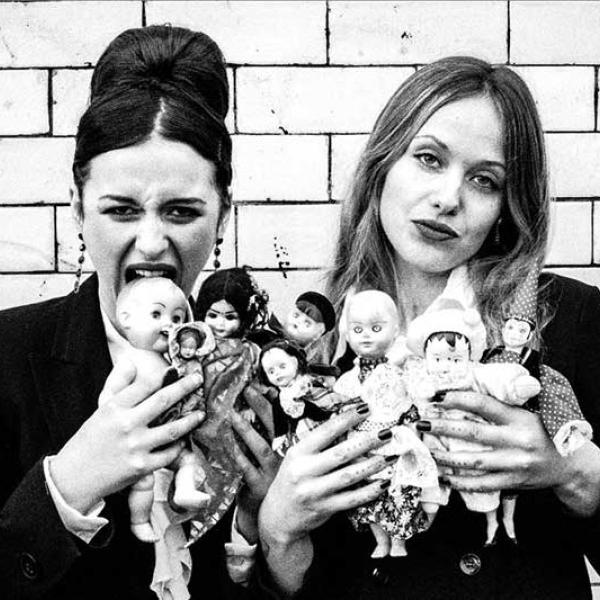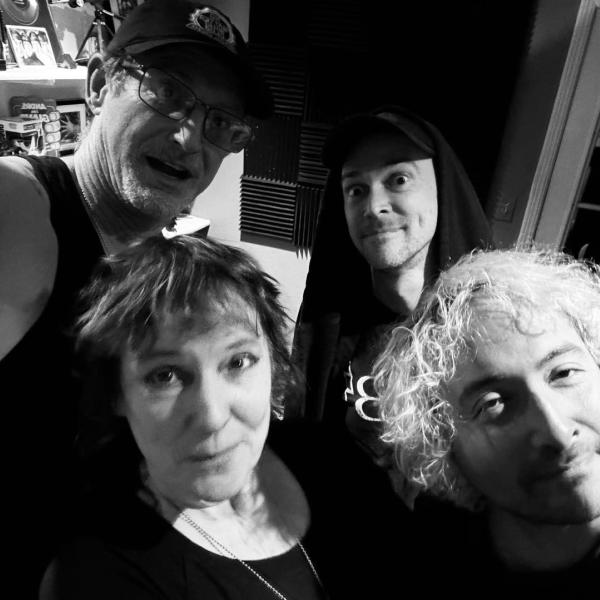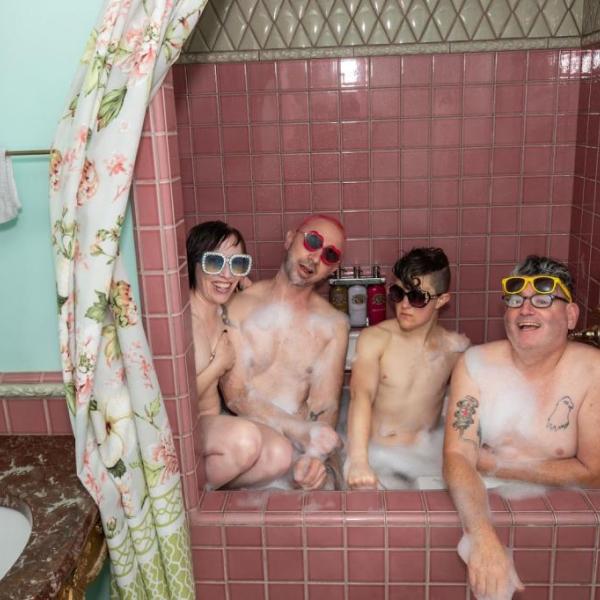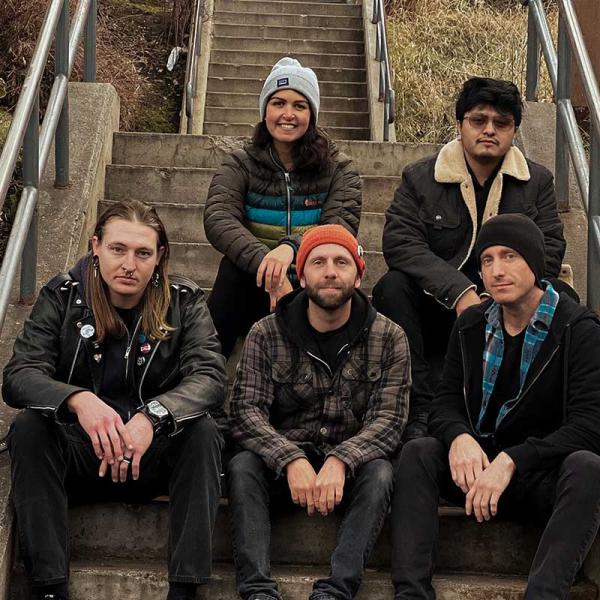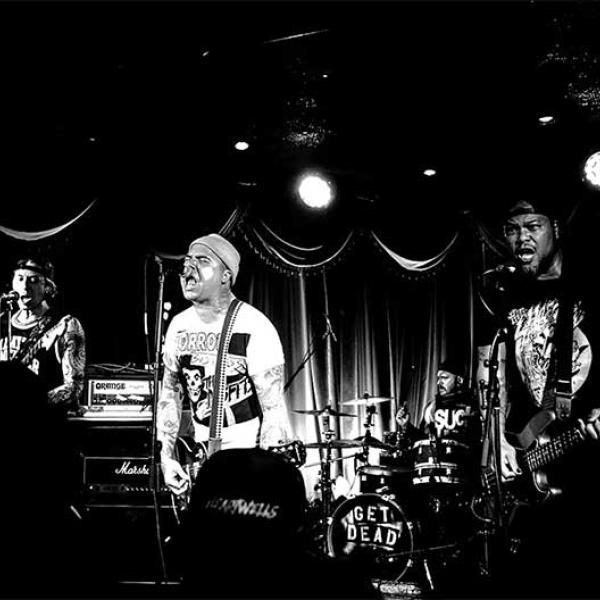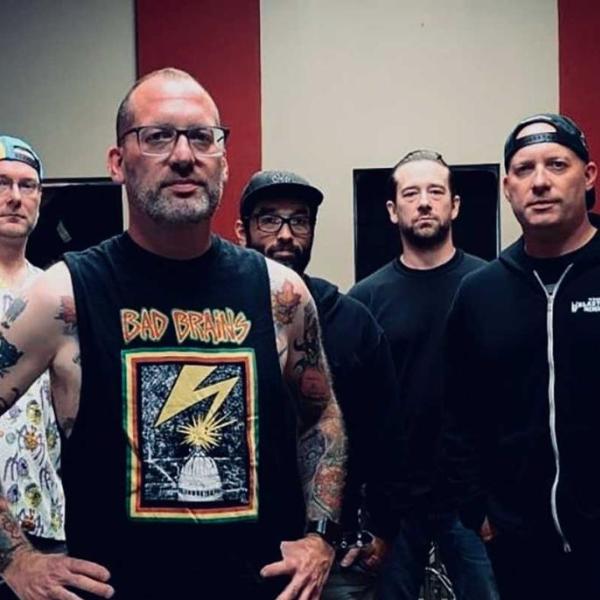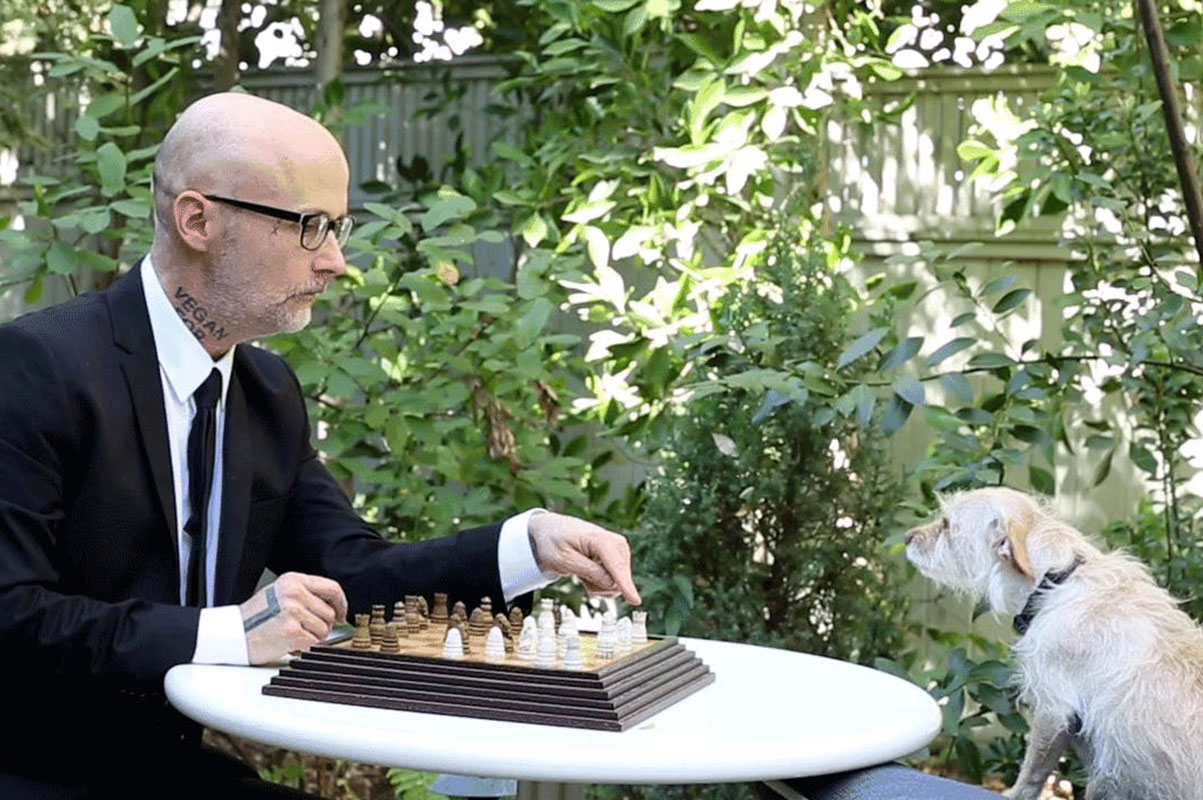
Features
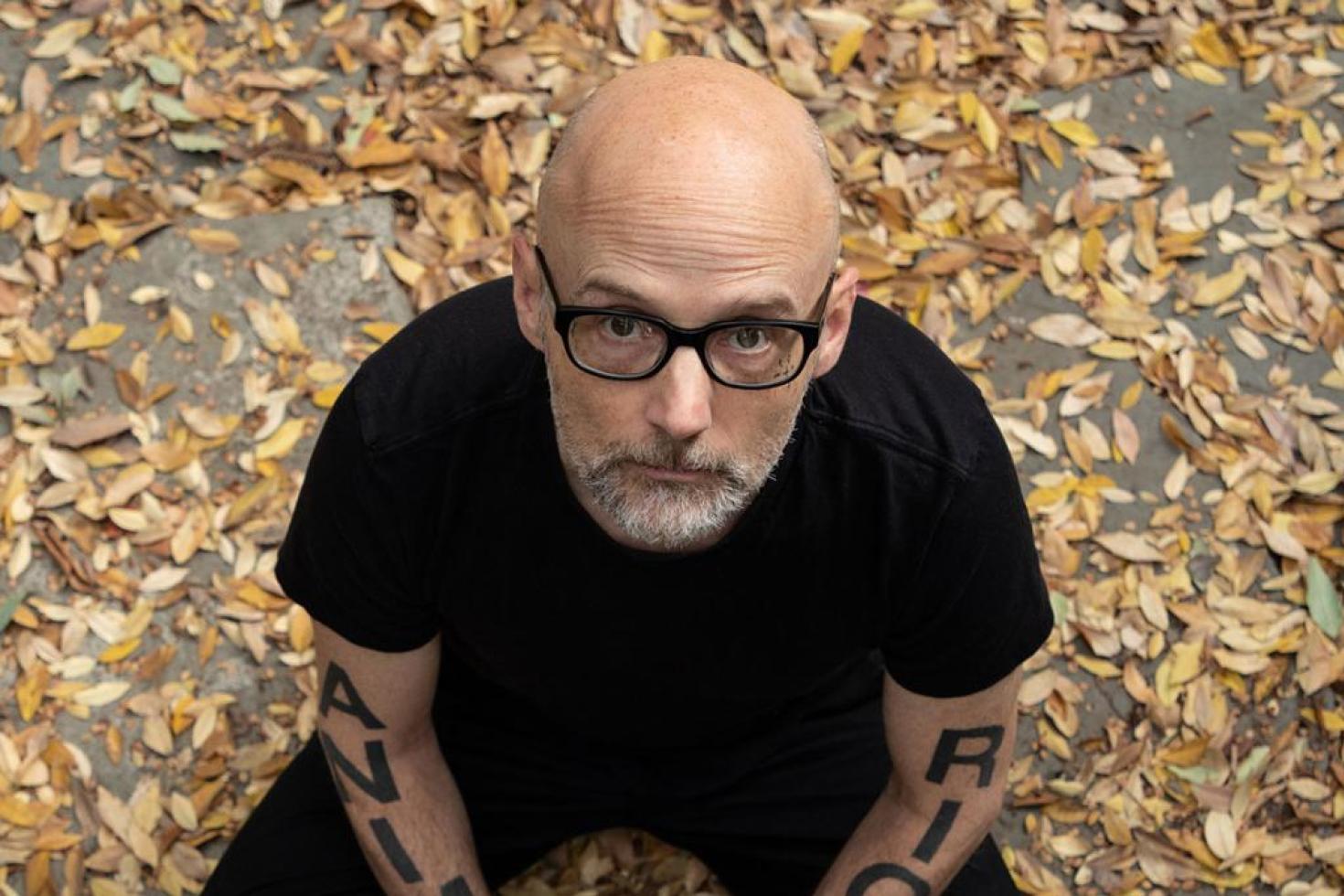
Moby has been a vegan and vegan activist for 35 years. He grew up in and around New York City and played guitar with Connecticut and NYC hardcore band, The Vatican Commandos. He also sang with Flipper for two days, even though none of the remaining members of Flipper actually remember this. While he loves making music, his life's work is helping to create a world wherein animals simply are free to live their own lives.
Moby recently made his directorial debut, ‘Punk Rock Vegan Movie’, a documentary that takes a passionate and stylistically idiosyncratic look at the ongoing relationship between the worlds of punk rock and animal rights. It includes interviews with some of the biggest names in punk and rock history, like Ian Mackaye, HR, Dave Navarro, Ray Cappo, Tim McIlrath, Walter Schreifels, Steve Ignorant, Doyle Wolfgang von Frankenstein, and many more.
In ‘Punk Rock Vegan Movie,’ Moby tells the story of how punk rock became such a fertile and surprising breeding ground for vegan activism. It’s also a call to action, unapologetically reminding people that in a deeply broken world it’s incumbent upon each of us to stand up and fight intelligently, passionately, and loudly against injustice.
In the spirit of punk rock, Moby is giving the film away for free. You can watch it below the interview.
PRT: What was your introduction to punk rock and was it an immediate love affair?
Moby: Well, the first time I heard punk rock was The Clash with the song ‘I Fought the Law’. There was this radio station in New York in the 70s that started playing new wave and punk rock in between The Who and Led Zeppelin. I held this old dictaphone I had up to the speaker, recorded it and then listened to it over and over again. This was probably 1978 or maybe ‘79. And then the second time I came into contact with punk rock was through this weird movie called ‘Mr. Mike's Mondo Video’. And in the movie, they had Sid Vicious singing ‘My Way’. And then a friend of mine's cool older brother had a copy of ‘Nevermind the Bollocks’ that he loaned to me, and I just felt like I had discovered this entire new world. Because I had.
PRT: And then how did you first find out about veganism through punk rock?
Moby: Well, in 1980 I started a punk rock band with my friends, Jim and Chip and John. We eventually became known as Vatican Commandos because we thought that name was funny. And in 1982, we did our one and only tour, which involved getting a bunch of Connecticut hardcore bands to drive to Ohio to play a show in a pizza parlor. I think it was Violent Children - which went on to become Youth of Today - and Reflex From Pain and 76% Uncertain and maybe Lost Generation. When we were in Akron, Ohio, we stayed in a punk rock squat, which turned out to be a vegan squat. Up until that point, I had never even heard the word ‘vegan’. I was a 16-year-old kid that loved eating McDonald's and I thought this was so strange that these punk rockers were animal rights activists. But then lo and behold, a couple of years later, I became a vegan and gave up the ways of just being a suburban idiot eating McDonald's.
PRT: Was there one specific moment when you decided to become a vegan or was it more of a gradual process?
Moby: Well, I went vegetarian first in 1984 when I was petting a rescue cat who lived with us. I had this moment where all of a sudden I realized that I loved animals unconditionally, and suddenly it just struck me that it was so completely hypocritical and inconsistent to love animals while also contributing to animal suffering and death. And then in November 1987, I went vegan. 35 Years ago. And really the catalyst, what led me to become vegan was the book ‘Diet for a New America’ by John Robbins. Because before reading that book, I thought that the most ethical thing was to just give up eating meat, but still eat cheese and dairy and that book sort of proved to me that if I cared about animals, if I didn't want to contribute to animal suffering, I had to go vegan.
PRT: I think that up until a couple of years ago, the image that most people had of vegans was that of tree hugging hippies. Do you feel that most of the misconceptions around veganism have faded away now?
Moby: Now it just seems that people are confused because they think that veganism equals health food. But then they go and eat deep-fried Impossible burgers. Or they think that vegans are skinny, weird tree huggers, and then they see Venus and Serena Williams who are vegan. Or I can't pronounce his name, but the tennis player who just won the French Grand Slam. Or the number of other athletes who are vegan. The number of rock stars who are vegan. The number of movie stars who are vegan. So I feel like a lot of people are very confused. They still want to make fun of vegans for being tree huggers who eat health food, but then they look at these athletes who are winning basically everything that they compete in, and it makes it a little harder for them to dismiss vegans as just being skinny weirdos.
PRT: How do you see veganism evolve over the next 10 years?
Moby: I was listening to the Podcast by The New York Times’ Ezra Klein. I can't remember the guy he was interviewing, but it was a futurologist. And one of his questions to the futurologist was “What will future generations be so confused by regarding our actions and what will they be horrified by?” And the futurologists simply said, “animals, how we treat animals”. And I completely agree.
There's such a confusion on the part of animal rights activists, because we are not asking people to believe anything different. People already love animals. People are already horrified by the idea of hurting animals. No one wants to hurt an animal, no one wants to kill an animal unless you're Ted Nugent or Donald Trump Jr. But yet everybody still eats meat and dairy and contributes to animal suffering and death.
So there's that confusion on the part of animal rights activists where we all agree the only difference is that the actions of vegans are consistent with our beliefs. And I'm not saying that makes us better. I'm just saying it means we're so confused by everyone else. And so my prediction based on human history is at some point that cognitive dissonance will be eliminated.
There's so much historical precedent for cognitive or behavioral dissonance being wiped out. Before the Civil War, people were horrified by slavery, but they had slaves. 15 Years ago, people were horrified by the idea of same sex couples, and now we have same sex marriage. For the longest time, people were horrified at the fact that women couldn't vote, and now women can vote. People were horrified at children working in factories and now children, at least in the Western world, don't work in factories. So on and on there's this longstanding trajectory of humans eventually aligning their actions with their morals and beliefs. And I just have to think that at some point, humans will wake up and say, oh, this is awful, and we simply shouldn't support the fact that 1 trillion animals are tortured and killed every year.
PRT: And is that just a matter of time you think? Or does something else need to happen for people to give up meat?
Moby: There are a bunch of variables there. One of the biggest variables is subsidies. And what I mean by that is that every aspect of animal agriculture, both for food and for fashion, is heavily subsidized by tax dollars. There's a great book that came out called ‘Meatonomics’ about this aspect of subsidizing meat and dairy production, and they looked at what the cost of meat would be if it wasn't subsidized. And basically, if a family of four went to Burger King and there were no subsidies involved, their dinner would cost around $90. A gallon of milk without subsidies would cost $25. And so my hope is at some point, politicians everywhere might at some point do the right thing and stop subsidizing industries that are killing us, destroying the environment and killing animals.
PRT: In the documentary, you address how difficult it was to tour as a vegan, whereas nowadays, there are tons of vegan restaurants everywhere. What is the one thing about eating vegan you wish you knew right from the start?
Moby: That's a good question but my answer is going to be really boring and banal. The one thing I wish I had known when I started was that oatmeal was vegan.
I think it was about 1990 when I finally figured out that oatmeal with walnuts and raisins is vegan and delicious, and you can get it everywhere. I can’t count the number of times I've been hungry in an airport or a train station or a hotel, and I happen to have oatmeal with me. And I know that that's a really unglamorous answer, but before I had so many horrible vegan touring experiences.
One time in Belgium, I opened up my keyboard case and I had a box of soy milk in there that had exploded during the flight. My equipment, my clothes, everything was covered in soy milk. And if you've ever smelled old spoilt soy milk, you’ll know it's disgusting. I love soy milk, but like most things it doesn't age well. But yeah, my vegan tour lifesaver was oatmeal. It's so easy. TSA doesn't take it out of your bag. To this day, whenever I go to an airport, I always bring oatmeal.
PRT: Where did the idea come from to make this documentary? And why now?
Moby: Well, the idea came about six years ago. I was talking to some animal rights activists, and these are people who had tattoos, piercings and listened to alternative music. And I realized very few people knew about the history of punk rock and animal rights. I assumed everyone did, but that's just because I'm old and I grew up with Ray Cappo and Porcell and John Joseph. And I thought this is a really interesting, surprising story that needed to be told because outside the world of punk rock, most people think punk rock is just nihilism and violence.
So I wanted to tell this story and use whatever limited resources and platforms I have to try and address the issue of animal rights and veganism in a unique way. That's my job. I love making music and I love making records, but I don't really care if anyone buys my records. I don't really care if anyone likes me. Literally the only thing that I care about is addressing this issue of animal rights. That's my life's work. My reason for waking up in the morning is trying to create a world where animals are no longer tortured and killed by and for humans.
PRT: In other music genres, artists are influenced by each other musically, but not ideologically. Why do you think that is so different in punk rock and hardcore?
Moby: That's a wonderful question. The ancillary aspect is so depressing because outside of punk rock and some hip hop and a little bit of indie rock, music is so apolitical. I went to a Grammy party a few years ago, and I walked out because it was so self-involved and self-congratulatory. And I was like, where did it go? What happened to the spirit of Neil Young and Marvin Gaye and Billie Holiday and The Clash and Public Enemy and John Lennon? Where did that go? When did it become just sad music for TikTok dances? When did musicians become so afraid of saying something that might challenge an algorithm to suppress their content? I find it unspeakably depressing that their legacy has become this anodyne garbage pop culture that's just so timid.
So to answer your question… from the beginning, punk rock obviously had this idea baked into its DNA that mainstream culture is awful and most likely needs to be rejected in all of its forms. And once you start that process, you start questioning everything. If you start questioning music, that leads you to question things like fashion, politics, gender roles and social justice. And for a lot of people, obviously, it leads them to question how their food is produced.
PRT: Making a documentary was first for you. How different was the creative process for you compared to when you are making music?
Moby: I knew from the beginning that I wanted to give it away for free. As a result, we tried to keep the costs as low as possible. That way, there would never be even a temptation to try and monetize it, because to state the obvious, there are a lot of people in the world who are barely getting by and would really struggle to pay for a movie. And I didn't want to create barriers for anyone to experience this, especially in the developing world and the non-western world. So that idea of let's make it in-house and let's make it as inexpensively as possible, was there from the beginning.
And that also sort of led me to be the cameraman, the composer and the animator. I mean, why would I increase the budget for the movie by paying someone to do something I already love? And regarding making a documentary versus making music, it's a lot more work, especially given my lack of experience. I've been working in recording studios since the mid 80s. I'm pretty familiar with how to make a record. It doesn't mean I make a good record, but I know what's involved. Whereas with this… for example, my friend Lindsay, who runs my production company, and myself, we had never made stop-motion animation, so we had to teach ourselves how to do it while we were making the movie Which was really fun. But it definitely added a little bit of stress and time to it.
PRT: Did you consider making a documentary about veganism in general rather than exploring the link between punk rock and veganism?
Moby: Yes, I'll make anything that tries to move the needle away from the current system. I've helped produce quite a lot of documentaries about animal agriculture, from the future of clean protein to fashion to environmentalism. I've tried to help other people make their films. But what I've noticed is that the world is filled with incredibly well-made, incredibly principled documentaries that never find an audience.
So another reason why I wanted to make this particular documentary was because I knew that by definition, given the weirdness of the subject matter, given the fact that no one thinks of me as being a punk rocker, given the fact that the story hadn't been told, I just thought it might potentially break through a little bit in ways that a lot of documentaries don't.
PRT: And what was one of the biggest challenges that you came across while making the documentary being new at it?
Moby: Well, there's some very earnest elements in the documentary along with a bunch of completely ridiculous elements and the biggest challenge was finding the balance between the two. I'm a ridiculous human being. So my inclination was to put a lot of ridiculous stuff in there. And the people I work with had to rein me in because sure, some ridiculous stuff breaks it up. It's fun, it's lighthearted. But we didn't want to take anything away from the earnest elements. But I also sort of knew if the movie was only dark and earnest, very few people would watch it to the end.
Plus there is that long tradition in the world of hardcore of the earnest and the ridiculous going hand in hand. Think of the Dead Kennedys' ‘Fresh Fruit for Rotting Vegetables’. At times it's super earnest, and at times it's just patently ridiculous. Or even Black Flag’s ‘Damaged’ album. It has some of the darkest punk rock ever made, but it also has ‘TV Party’.
Even a serious band like Minor Threat has ‘Salad Days’ and the cover of ‘12XU’. So there's definitely precedent for punk rock being dark and earnest, but also really playful and lighthearted at times. So that was the biggest challenge: including ridiculous stuff that would not detract from the earnest elements.
PRT: Meeting up with your friends from the punk and hardcore scene, did it ignite something? Can we expect another punk rock album by Moby?
Moby: Oh, I would love to make another hardcore or punk rock record. I don't really expect anyone to pay attention or listen to it. But there's a reason why so many people on the planet love playing really loud guitar and yelling at the top of their lungs. It's just so satisfying.
And the truth is, I have the weirdest music listening habits. I got my Spotify year-end wrap up, and it was half classical music and half punk rock and speed metal. Ralph Vaughan Williams and Pro-Pain. Barber and the Bad Brains. Oh, and Ultravox. I really love the band Ultravox.
I especially love a lot of fairly newer super-heavy punk rock and metal. Like I said, Pro-Pain, I really like them. And ACxDC. I played ACxDC to some of my friends and they were horrified by it. My friends who come from the world of punk rock, and even they couldn't handle it. And I was like, yeah, it's about as fast and aggressive as music can be, but the guys who make it are some of the brightest animal rights activists I've ever met.
PRT: The people that you talk to in the movie, they're like a who's who in punk rock and hardcore from both the early days and more recent bands. How did you decide on who to talk to for the documentary?
Moby: I basically made a list of every punk rocker I knew. I really wanted to start including some people from the metal world, but I thought that would confuse things a bit too much. There ended up being some overlap though. Doyle sort of. And Alissa from Arch Enemy. And the original is Geezer Butler. He's been a vegan since 1970, I believe.
But I don't have as much connection to the metal world. I've never really played in a metal band. So I just basically made this long list of every punk rock/animal rights/vegan person I could think of. And luckily I already knew about a third of them. Like Porcell and Ray, I have known them since 1981, I think. And I just kept reaching out to people. And in some cases it took a long time. Steve Ignorant (from Crass) was delightful, but getting his email address was really months and months of sleuthing on my part. And then it was my friend Derek, who had started the label One Little Indian that signed Björk and who had been in the band Flux of Pink Indians, who is friends with Dunston Bruce from Chumbawamba. And it turns out Chumbawamba, they have their big hit, but they had been anarcho punk rockers in the seventies. And Dunston had Steve Ignorant's email address. So sometimes it took a lot of effort and time.
Or I had heard that Scott from Earth Crisis and Andrew from Fall Out Boy had started a hardcore band called Sect, and that they were playing a show in a record shop in Orange County. So I just drove down there with my camera and some recording equipment and showed up and said, ‘hey, can I interview you for this punk rock vegan movie?’ I had never met any of them. And I think they were a little surprised that I just showed up by myself and asked if I could interview them in the parking lot after their soundcheck.
PRT: One last question because I think we're almost out of time. I did a little experiment with ChatGPT and asked for five questions that nobody had ever asked you before in an interview. Four were terrible. But there was one that I was curious about and that was, what is your most memorable fan interaction?
Moby: (laughs) Wow. I've had a lot of very strange ones. One that comes to mind is from the first time I went on tour with The Prodigy. We played a show in Los Angeles and the guys from ZZ Top came backstage and we were like, what's going on? Why are ZZ Top backstage? Turns out they love electronic music.
But the one that really comes to mind was when I was playing a show in Lawrence, Kansas around Halloween back in 1994. I mainly wanted to go to Lawrence, Kansas because that's where William S. Burroughs lived, and I was just so fascinated to meet him. But the show was this really chaotic environment. I mean, Halloween in Lawrence, Kansas, the land of William S. Burroughs. It was degenerate and chaotic. And I looked out over the crowd while I was performing and there was this very tall, very attractive trans woman who beckoned me to the front of the stage. So I walked to the front of the stage and she grabbed me and she really aggressively bit my penis through my trousers. It was not nice, but it was so surprising and in keeping with playing a show in William S. Burroughs' hometown, that I actually thought it was kind of great. And then afterwards I talked to her and she said, 'I'm sorry I took a lot of drugs. I just had to do that.' Has almost nothing to do with the world of punk rock except that William S. Burroughs was involved and obviously he was definitely a tangential punk rock icon.


